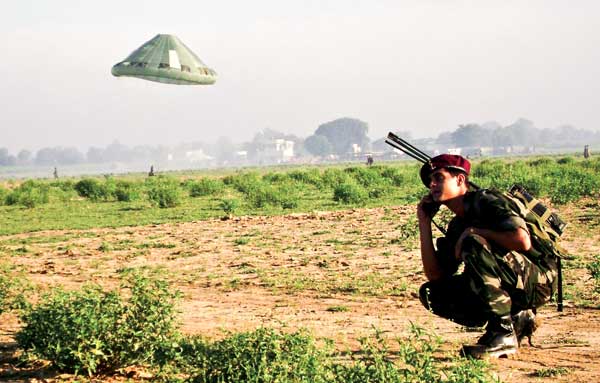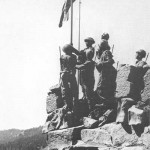Introduction
The passage of the Inter-Services Organisation (Command, Control & Discipline) Bill, by the Parliament on August 09, 2023[i] is a step closer towards realising the long-awaited reforms process that includes theaterisation of the Armed Forces in India. As momentum gains for the proposed reorganisation of the Indian military into integrated theatre commands, this bill serves as an enabling step to further support the integration efforts of the armed forces.In this, the Bill acts as a precursor to the reorganisation of the military into integrated theatre commands on which there is consensus now for the creation of two land-based intergraded commands and one maritime theatre command.
The Need for Jointness and Integration in Indian Armed Forces
Prior to the passage of the Bill in the Parliament, the Standing Committee on Defence had given suggestion pertaining to Tri-Service/Theatre Commands[ii]. Before this also, certain steps were taken. For instance, the Andaman and Nicobar Command was set up in 2001 as an integrated theatre command for strategic reasons. Theaterisation has long been in discussion. It is rooted in reorganisation of the Armed Forces into different theatre commands. The thought has evolved on the principle of ‘One Border, One Force’. Thus, the Western border with Pakistan may be looked after by an integrated theatre command, and the border with China by another command. For maritime border, there may be another integrated theatre command. Presently, three Armed Forces in the country have 17 commands including seven each of the Indian Army and the Indian Air Force, and three of the Indian Navy. In integrated theatre commands, assets of all three forces will operate under one commander.
Hence, the commander-in-chief or officer-in-command will require powers to be exercised on personnel from all three functional forces, under a legal framework provided by the Bill regarding the ISOs. Once theaterisation takes place, only a notification will have to be issued to make effective the ISO legal framework. Communist China, with whom India shares a long and contested border, reorganised its seven military regions into five theatre commands a few years ago. India also needed to evolve its response to such changes.
Currently, armed forces personnel in India are governed in accordance with the provisions contained in their respective Service Acts — The Army Act, 1950; The Navy Act, 1957; and The Air Force Act, 1950. This has a direct impact on command, control and discipline of the Inter-services Organisations as the Commander-in-Chief or Officer-in-Command of such Inter-services Organisations (ISOs) are not empowered to exercise disciplinary and administrative powers over the personnel belonging to other services. As a result, the personnel serving in the ISOs need to be reverted back to their parent Service units for any disciplinary or administrative action. This is not only time consuming, but also has financial implications relating to the movement of the personnel. The problem becomes more cumbersome when the proceedings arise from the same set of facts and circumstances but involves personnel belonging to different services. As a result, multiple sets of proceedings under the respective Service Acts are required to be initiated, which impedes expeditious disposal of cases, thereby affecting the standard of discipline.
Moving away from this segregation, the Bill enables the Government to constitute inter-services organisations (ISOs). It seeks to empower the Commander-in-Chief and Officers-in Command of the ISOs with all disciplinary and administrative powers with respect to personnel serving in or attached to such organisations.This does not mean that only after the said Bill becoming an Act, such ISOs will come into existence. Already, there are inter-services organisations operating in the country. For example, the Andaman and Nicobar Command, the Defence Space Agency, and the National Defence Academy are such organisations. Each one of them ‘exists’, but the new law will provide for legal sanction for their ‘constitution’. Apart from the technical aspect, the larger objective of the Bill is to prepare the Indian Armed Forces to respond in a better and more effective and organised manner to the changing nature of warfare in the world. The boost to the ISO mechanism will ensure expediting the process of jointness among the forces, further improving the level of integration, and making inter-operability smoother. This is required given the emerging challenges wherein the warfare today has become hybrid, technology oriented and network-centric – as has been pointed out by the Defence Minister[iii].
Key Features of the Inter-Services Organisation (Command, Control & Discipline) Bill 2023
-
- Inter-services Organisation[iv]: The ‘ISO Bill – 2023’ shall be applicable to all personnel of regular Army, Navy, and Air force, and to persons of other forces as notified by the Central Government, who are serving in or attached to an Inter-Services Organisation. Existing Inter-services Organisations will be deemed to have been constituted under the Bill. These include the Andaman and Nicobar Command, the Defence Space Agency, and the National Defence Academy. The central government may constitute an Inter-services Organisation which has personnel belonging to at least two of the three services: the army, the navy, and the air force. These may be placed under the command of an Officer-in-Command. These organisations may also include a Joint Services Command, which may be placed under the command of a Commander-in-Chief.
-
- Control of Inter-services Organisations: Presently, the Commander-in-Chief or Officer-in-Command of Inter-services Organisations are not empowered to exercise disciplinary or administrative powers over the personnel belonging to other services. The Bill empowers the Commander-in-Chief or the Officer-in-Command of an Inter-services Organisation to exercise command and control over the personnel serving in or attached to it. He/She would be responsible for maintaining discipline and ensuring proper discharge of duties by the service personnel.The superintendence of an Inter-services Organisation will be vested in the central government. The government may also issue directions to such organisations on grounds of national security, general administration, or public interest.
-
- Other forces under central government: The central government may notify any force raised and maintained in India to which the Bill will apply. This would be in addition to army, navy, and air force personnel. The Assam Rifles, Border Roads Organisation, Indian Coast Guard etc. are the probable organisations to which this particular bill may be applied, in the future, since operationally they work very closely with the armed forces.
-
- Commander-in-Chief: The officers eligible to be appointed as the Commander-in-Chief or Officer-in-Command are: (i) a General Officer of the regular Army (above the rank of Brigadier), (ii) a Flag Officer of the Navy (rank of Admiral of the Fleet, Admiral, Vice-Admiral, or Rear-Admiral), or (iii) an Air Officer of the Air Force (above the rank of group captain).He/She will be empowered to exercise all disciplinary and administrative powers vested in: (i) General Officer Commanding the Army, (ii) Flag Officer Commanding-in-Chief of a Naval Command, (iii) Air Officer Commanding-in-Chief of an Air Command, (iv) any other officer/authority specified in the service Acts, and (v) any other officer/authority notified by the government.
-
- Commanding Officer: The Bill provides for a Commanding Officer who will be in command of a unit, ship, or establishment. The officer will also perform duties assigned by the Commander-in-Chief or Officer-in-Command of the Inter-services Organisation. The Commanding Officer will be empowered to initiate all disciplinary or administrative actions over the personnel appointed, deputed, posted, or attached to that Inter-services Organisation. To maintain Command and Control in absence of the Commander-in-Chief or the Officer-in-Command, the officiating incumbent or the officer on whom the command develops in absence of a C-in-C or Oi/C, will also be empowered to initiate all disciplinary or administrative actions overs the service personnel, appointed, deputed, posted or attached to an Inter-Services organisation. The Bill also empowers the Commanding Officer of an Inter-Services organisation to initiate all disciplinary or administrative actions over the personnel appointed, deputed, posted or attached to that Inter-Services Organisation. For the purpose of this Act, Commanding Officer means the officer in actual command of the unit, ship or establishment.
Expected Reforms by the passage of the ISO Bill 2023
-
- The enactment of the Bill will have various tangible benefits such as maintenance of effective discipline in inter-services establishments by the Heads of ISOs- no requirement of reverting personnel under disciplinary proceedings to their parent Service units, expeditious disposal of cases of misdemeanour or indiscipline and saving of public money & time by avoiding multiple proceedings.
- The Bill would also pave the way for much greater integration and jointness amongst the three Services; lay a strong foundation for creation of Joint Structures in times to come and further improve the functioning of the Armed Forces.
- The ‘ISO Bill-2023’ is not disruptive in the sense that it does not propose any change in the existing Service Acts/Rules/Regulations which are time-tested and have withstood judicial scrutiny over the last seven decades.
- The Bill is being seen as necessary to strengthen the Armed Forces in view of the global security scenario and that, it is only through better jointness and integration, can the military move forward towards securing national interests. The Parliament was informed by the Raksha Mantri, that emerging warfare scenarios are network-centric and that necessitates the passage of such laws to enable the forces to be mission ready for new-age warfare[v].
- The powers bestowed by the bill to the Commanders will translate into fostering seamless jointness and integration among the armed forces in terms of personnel management and infrastructure development, which is imperative to safeguarding national interests in today’s complex security landscape.With the establishment of an inclusive framework, forces can thus opt for a comprehensive approach to maintain discipline and facilitate the efficient discharge of duties.
Conclusion
The integration of Indian armed forces with renewed vigour and future-readiness has been indeed boosted by this bill. The passage of the Inter-Services Organisation (Command, Control & Discipline) Bill, 2023 is significant enabling step in that direction. As soon as the Bill gets the President’s assent, announcement of integrated theatre commands may not be far away in time. But as has been the case with many military reforms initiatives in India previously, the implementation part is where most of the problems arise from[vi]. The military as well as the civil bureaucracy are usually reform-averse and try to maintain the status quo. Therefore what is now needed is the proper implementation of the bill by all concerned stakeholders to realise its actual effectiveness – both in letter, and spirit.
————————–
[i] https://www.thehindubusinessline.com/news/parliament-clears-inter-services-organisation-command-control-discipline-bill/article67171889.ece
[ii] https://www.thehitavada.com/Encyc/2023/8/10/A-STEP-CLOSER.html
[iii] https://pib.gov.in/PressReleasePage.aspx?PRID=1946667
[iv] https://prsindia.org/billtrack/the-inter-services-organisations-command-control-and-discipline-bill-2023
[v] https://pib.gov.in/PressReleasePage.aspx?PRID=1946667
[vi] https://www.brookings.edu/wp-content/uploads/2018/04/book-defence-reform-3.pdf





